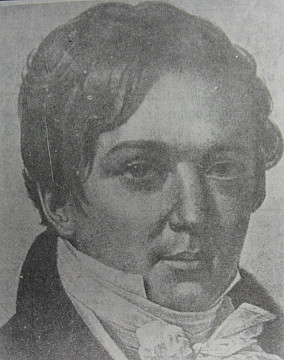Bernard de Marigny (1785-1868)
of the Marigny Plantation & President of the Louisiana State Senate
He was born in New Orleans, Louisiana, and was brought up on his family's extensive plantation, Marigny, where as a young teenager in 1798 he witnessed the lavish entertainments laid on by his father for their guests, Louis-Philippe, Duc d'Orléans (afterwards King Louis Philippe I), and his two brothers, the Duc de Montpensier and the Comte de Beaujolais. He served in the U.S. Army and at the Battle of New Orleans in 1815 he was aide-de-camp to William Claiborne, 1st Governor of Louisiana. He participated in framing the 1st and 2nd Constitutions of Louisiana, served in the Louisiana Territorial Legislature, and was elected President of the Louisiana Senate in 1822-23. In 1805, he began the subdivision of his plantation and created the first suburb below the City of New Orleans - Faubourg Marigny - where immigrants and freed slaves settled as others moved further up-river. In 1834 he created the Faubourg Mandeville. Two streets in the City of New Orleans honor his family's name - Mandeville and Marigny.
Although on the face of it he seemed a respectable citizen, by the time of his death he had lost nearly all of his fortune. This is explained by historians: "His every whim [was] indulged while his father was alive, he became as wild and headstrong after his death as an unbacked [wild] mustang, and his guardian, abandoning all idea of control, finally shipped him to England, hoping that life abroad might mend his manners; but in London, Bernard's dissipations became only more pyrotechnic, and he spent most of his time at Almack's and other famous gambling places." He funded the first organized New Orleans Mardi Gras celebration in 1833 and in 1838 he co-founded the "Louisiana Race Course" (now the Fair Grounds Race Course) with Julius C. Branch and Henry Augustine Tayloe. His son, Antoine, married the daughter of William Claiborne, 1st Governor of Louisiana.
Although on the face of it he seemed a respectable citizen, by the time of his death he had lost nearly all of his fortune. This is explained by historians: "His every whim [was] indulged while his father was alive, he became as wild and headstrong after his death as an unbacked [wild] mustang, and his guardian, abandoning all idea of control, finally shipped him to England, hoping that life abroad might mend his manners; but in London, Bernard's dissipations became only more pyrotechnic, and he spent most of his time at Almack's and other famous gambling places." He funded the first organized New Orleans Mardi Gras celebration in 1833 and in 1838 he co-founded the "Louisiana Race Course" (now the Fair Grounds Race Course) with Julius C. Branch and Henry Augustine Tayloe. His son, Antoine, married the daughter of William Claiborne, 1st Governor of Louisiana.





